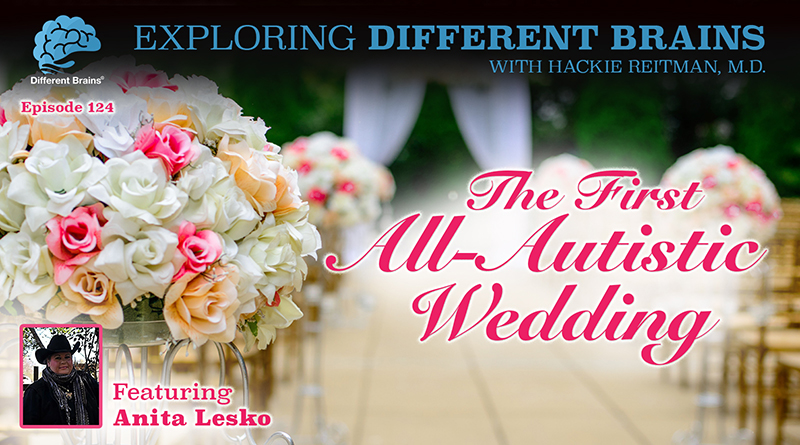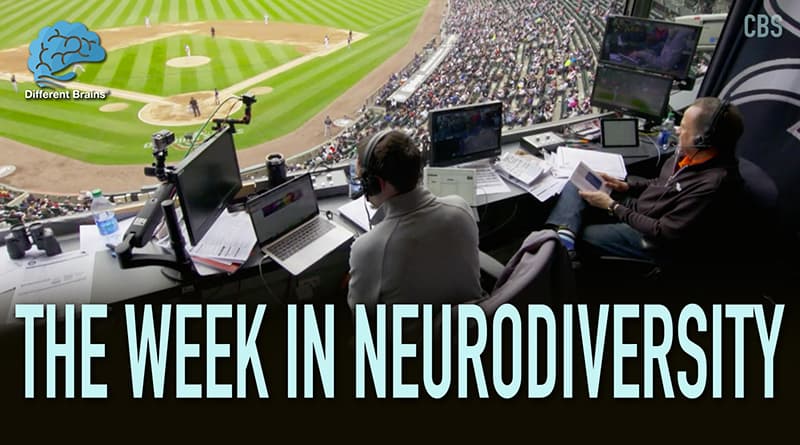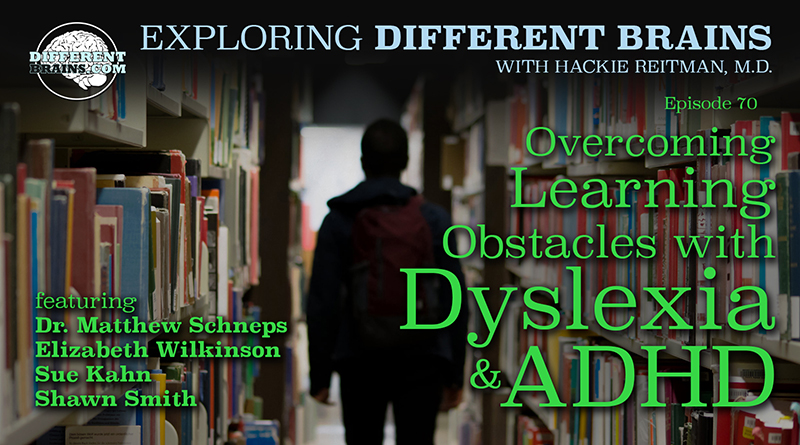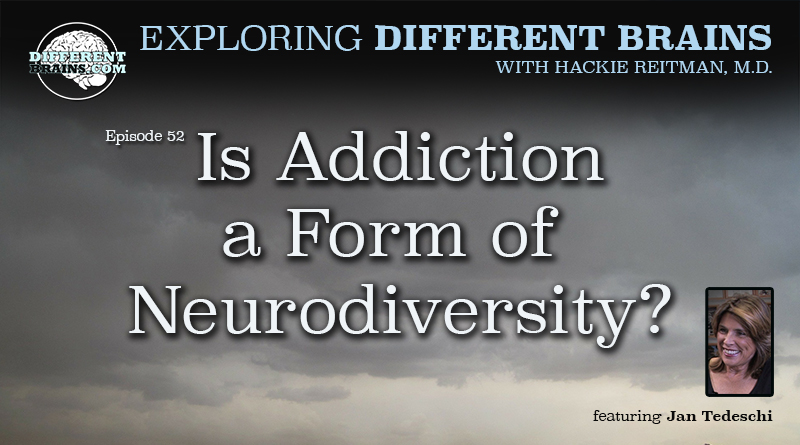
The First All-Autistic Wedding, with Anita Lesko | EDB 124
(18 mins) In this episode, Dr. Hackie Reitman continues his conversation with Anita Lesko, BSN, RN, MS, CRNA. Anita is an internationally recognized autism advocate and member of Autism Society of America’s Panel of Autistic Advisors. She is also an author, with her most recent book being Temple Grandin: The Stories I Tell My Friends. Anita discusses marrying her husband who is also on the spectrum in an all-autistic ceremony officiated by Dr. Stephen Shore, and shares some of her stories of friendship with Dr. Temple Grandin.
For more information, go to: http://AnitaLesko.com/
Look for Temple Grandin: The Stories I Tell My Friends at Amazon, Future Horizons, or anywhere else books are sold.
.
57 Second Preview:
.
To listen or download the podcast version of this episode, see the embedded player below.
Or look for us on your favorite podcast provider:
iTunes | Stitcher | SoundCloud
[expand title=”View Full Transcript”]
HACKIE REITMAN, M.D. (HR): Hi, I’m Dr. Hackie Reitman. Welcome to another episode of Exploring Different Brains. We have a wonderful returning guest today. We have none other than Anita Lesko. Anita, welcome to Different Brains.
ANITA LESKO (AL): Thank you. I’m pleased to be here today.
HR: Now I want to hear from you about our Different Brains friend who’s wonderful, Steven Shore, who officiated, I understand, at your all-autistic wedding. Tell us about this concept and the whole thing.
AL: Well, when I met my husband, I had started an autism support group. This is after I got diagnosed and I started the autism support group and I’d been doing that a couple of years, actually. I did it once a month, on a Saturday, and one day he walked in and there was something about him that struck me right away and we became friends. For the following year we were friends before it turned into a romantic relationship, and then when we got engaged, December of 2014, at that point, a few months prior to that, I got invited to speak at a conference in San Diego called the Love and Autism Conference. I was already going to go and speak at that, and after we got engaged I called the lady and I said, “What would you think of having a wedding at your Love and Autism Conference?” She was like, “Oh wow, that sounds really exciting.” So the next thing evolved, it was like a week later. she and I were on the same wavelength, because almost simultaneously, we thought of, “Hey, let’s make the entire wedding party autistic.” So that’s what we did. So we knew Steven Shore, so he was the officiant for the wedding. He had to get some kind of special license to do that from San Diego. Alex Planck the best man for my husband Abraham. We had a young gal who was the harpist; she was on the spectrum. And all the other people that were involved. It was quite a big shindig at the conference. There were over 250 people in attendance at the conference for the wedding. The conference organizer/wedding planner was Dr. Jennie Palmiado, and so she orchestrated on her end the whole entire thing. Wedding cake, the whole nine yards. So our job was to show up and get married. This whole event, we wanted to open it to the public to let the public see that people on the spectrum have the same desire for love and romance and marriage like neurotypical people. Next thing we know, we get a call from people who were in that twice; they did a video segment on Good Morning America. I think about 80 other news venues, like Fox News and ABC. It was very overwhelming.
HR: Very cool. Yeah, Jennie, I was supposed to talk at that course, once, but I had a conflict with another one and I never got to meet her and go out there. My understanding is that that’s fabulous.
AL: That was quite an event. I can still remember just before I walked down the aisle, and a friend of ours from here in Pensacola had flown out to be the guy to walk me down the aisle, and I’m standing there, and they start playing Here Comes the Bride. I’m standing there and I’m like, my whole life, I had, before I discovered I had Asperger’s, but I realized I didn’t know how to make a relationship or keep it, so I long ago kind of reconciled with myself the fact that well, I’m never going to get married or anything because I don’t know how to make a friend. So standing there and realized I’m going to get married in a couple of minutes, and all of this is happening was very surreal and overwhelming. You know, something that neurotypical people take for granted, but for me this was unbelievable.
HR: I’d like to touch on something that often doesn’t get discussed with people on the spectrum which is: I want you to give some advice from your vantage point, your unique perspective, on relationships. Someone who’s in a relationship with someone on the spectrum.
AL: My husband and I talked. He’s autistic. I think our most positive aspect of our relationship is our ability to communicate. Now doesn’t that sound funny for two people on the autism spectrum who allegedly can’t communicate? But he and I, one of our hobbies with each other is sitting and talking with each other for hours and hours. On weekends, especially. Even if it’s hot out, we’ll jack up the air conditioner and build a fire in the fireplace, and then just sit there and talk for hours, like on the couch, my legs will be over his lap, and we’ll sit there holding hands and talking, talking, talking. We do things together all the time. We both love to cook, and so we rarely will go out to dinner. We always eat at home and make it from scratch. So we do that together. You have to find somebody that you can talk to and be friends with first. Because there isn’t going to be any kind of long lasting relationship if we can’t be friends with that person and have them think to get along together and share common interests together and just be able to sit and talk to each other. That’s what we think is a very, very strong component of the success of our marriage.
HR: Well, that’s great advice for all of us, for everybody, really, for communication and spending good quality time like that is paramount. And of course, those on the spectrum get a bad rap, because you’re not supposed to be able to communicate or socialize or listen to what the other person has to say.
AL: It’s kind of funny because a neurotypical friend of mine one day we’re talking about this, and I said, “You know, Abraham and I, we’ll just sit there. If there’s some kind of an issue or something, we just sit there and talk about it. We don’t play any kind of games or you know, ignore, all the games that I know neurotypical people do with each other, whether it’s a romantic relationship or even just a friendship. We just talk about it, you know? And we can talk for hours,” and then she says to me, “Well, Anita, we don’t -we meaning neurotypical- we don’t do that kind of thing. We put up kind of a wall around ourselves.” So maybe I just didn’t know any better and that’s all I know how to do. She thought that was pretty funny.
HR: Is there anything, Anita Lesko, that we have not covered that you would like to cover?
AL: Acceptance. That’s the elusive thing that we are all out after it. Everybody’s fighting for it who’s on the spectrum, and others of course who are involved with autistic people like yourself. How do we make the rest of the world really accept us? That’s different than tolerate us. Accepting us is a whole different word. How are we going to accomplish that? In this day and age especially, I see it as a little more challenging than had we been back in time 50 years earlier, where people were more mannered and polite and everything. Now we’ve all experienced it, being not accepted in the workplace, in various places. That’s why you know I love when I’m speaking at a conference, I feel that difference of being accepted. Everybody’s there; they’re excited to see Temple; they’re excited to see me. People, after we both do our presentations, people are coming up to her; they’re coming up to me and getting in line. They want the autographs and pictures. Well, sure it makes you feel really accepted, because they want to be by you and talk to you. My workplace I eat in silence every day, in the lounge room where the anesthesia people eat, and it’s kind of me always over there by myself when all my coworkers all talking and engaging and everything, and I’m just here by myself. So of course, it’s not very accepting feeling, and I hear the same from other people. From your standpoint, how would you say that we can make this happen?
HR: I would say that the way we make it happen is the way we make it happen right here in our office at Different Brains. We’re a neurodiverse bunch here and the vibes you get when you come over here, and I hope someday if you’re down here in South Florida you’ll come on by, and we also have a ritual that whenever we have a visitor, which is pretty frequent, we have the interns, staff, whoever happens to be here, because everybody’s working different hours to fit into their schedule without giving up their day job, and they come and sit in on the couches here and everyone has to introduce themselves, and you meet people in walks of life you haven’t experienced before, but the vibes you get in an inclusive setting are how it has to go out into society. When you get on a bus, when you go to work, when you go to school, and I think we’re trying to do it in the masses, and I think of it more as like a pebble in a lake. You do a pebble and then it spreads out from locally to do it. And then your people who have experienced it are able to do it elsewhere. I think inclusion, acceptance, getting rid of stigma, they’re all separate, but they all overlap in a degree. But it’s the people like you who are walking the walk as well as talking the talk, and you’re working and you’re married, and you got a smile on your face, and you dress how you want, and you’re out there doing it, and you’re laughing with Temple Grandin. This is beautiful stuff. You know, when I spoke at the USAAA out in Tuscon out a couple of years ago, and I end up speaking there every year, it was my first time, and in a very surrealistic situation, after the reception for the speakers, I found myself sitting alone at the bar with Temple Grandin. It’s like who am I to be hanging out with Temple Grandin? She was drinking water; I was drinking something stronger, and in one of the best things I ever did, I got to put her on the phone with my daughter Rebecca for ten minutes, and I wrote a blog article after. I listened to that conversation because I realized Steven Shore, Temple Grandin, my daughter, you, you are in a club of champions I’m not a part of. You guys are champions. You’re out there doing it. I’m the one on the outside, looking in. And I think that’s a great realization. When a guy like Jose Velasco, who’s a global leader for SAP, the world’s largest software company, we were on a panel together once at a conference, and they have a very good program there for autistic individuals within that company. And he turned to me and these are the things that’s gonna change the tide. He said, “Hackie, this is not a social welfare project for us. This is a business transition. This is good for our bottom line.” That’s when things start to change. They say, “Follow the money.” Google and Apple, when they’re recruiting Asperger’s, they know what they’re doing. When they design their workplaces now to be open with couches and some coffee, maybe even a beer machine, a keg, it’s changing a little bit. I didn’t mean to get off on a rant, but it’s, I’m starting to feel pretty positive about it.
AL: You’re so true on all of those. I love that. That was great.
HR: Anita, how can people find out more about you?
AL: On my website at anitalesko.com. I’m actually going to be speaking at many conferences with Temple Grandin. Future Horizons, the publisher of my book, has us lined up for various places around the country so I’ll be kind of jetsetting around with Temple, doing these presentations. And I have to say, I do very, very different kind of presentation than a typical presenter and I kind of put on a show in the beginning, which seems to really entertain the audience. I can’t give anything away, but I’ll just say that people are kind of, by the time I make my grand entrance, people are cheering and thinking this is like really exciting. I just eat it all up doing it. It’s just something different and it’s just very entertaining. It engages the audience a whole lot. Don’t forget to go to order this book about Temple Grandin that I wrote about her with all the interviews. It’s all her own words and it not only is you learn about Temple, but I also feel that this book is going to help change the world’s view of autism when they see that. Because people got the impression of her about the movie, which is excellent, the HBO movie, Temple Grandin, but they only see one part of her in that movie. This shows, I mean, when she talks about as a child, her most exciting memory on a beach was finding a message in a bottle on the beach. Something really entertaining, I’ll share this little tidbit, in most of our conversations, she talked about when she got to meet BF Skinner, and she was so excited to go to his office. She thought she was going to the god of psychology, and he invited her to come and visit him in his office at Harvard. She was so beside herself and she was wearing a dress and when she entered his office and sat down, he looks at her legs and he says, “May I touch your legs?” to which she replied without missing a beat, “You may look at my legs, but you may not touch them.” Well, I thought that was pretty awesome for her to say like that, some people wouldn’t. I personally would have just sat there looking at him in shock. Just the way she said it, it just was so cool, but to read the whole description of her getting ready to go there and experiencing that and how she felt when she walked out the door compared to how she felt going into the door to meet him. So it’s really very entertaining. Plus, in the book is a lot of things that is helpful. She talks about driving, so for people on the spectrum, teenagers or whatever, learning how to drive, really step by step that she accomplished it. She talks about jobs, how to get different jobs, things to help you get jobs, so there’s a lot of really educational stuff in there, and that she has a big message, because I asked her. I said, “Temple, what do you, what’s the essence; what would you like the readers to walk away with after they read this book?” so you see the whole thing, the chapter called “Temple’s Big Message.” So it’s really a must read. People aren’t going to believe it when they read it.
HR: Well, Anita, it’s been another excellent episode of Exploring Different Brains thanks to you. Thanks for enlightening us and inspiring us and keep up the great work you’re doing. Thank you so much.
AL: My pleasure.
[/expand]




